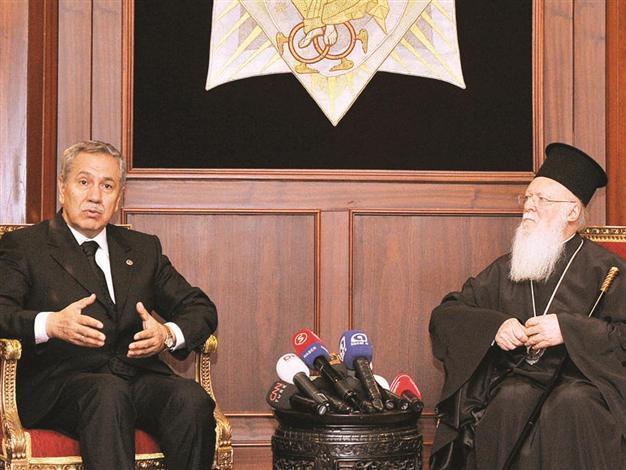Turkish government ‘firm’ on solving woes of minorities
ANKARA - Anatolia News Agency

Arınç said that the Foundations Council, the highest authority on religious foundations,
now includes a non-Muslim member representing minority faiths for the first time.
Turkey has taken several steps to ensure the rights of the country’s non-Muslim religious minorities after decades of official neglect and mistrust, Turkish Deputy Prime Minister Bülent Arınç has said, adding that the government was determined to solve minorities’ problems.
[Our goal is] to guarantee that the rule of law is applied equally for all Turkish citizens, regardless of individuals’
religion, ethnicity, or language,” Arınç said in a recent article to the “Project Syndicate” website.
“We are determined to solve [minorities’] remaining problems, and we believe that we can do so through mutual trust and cooperation,” he said.
“Turkey’s religious minorities include Greek Orthodox, Armenian, Assyrian, [Chaldean], and other Christian denominations, as well as Jews, all of whom are integral parts of Turkish society. As part of the Turkish government’s new initiative to end any sort of discrimination against these non-Muslim communities, President Abdullah Gül has emphasized that message by receiving Bartholemew, the Greek-Orthodox Patriarch of Istanbul, and by visiting a church and a synagogue in Hatay – a first by a Turkish president,” he said.
An August 2009 meeting in which Prime Minister Recep Tayyip Erdoğan met with leaders of religious minorities on Istanbul’s Büyükada island and listened to their problems and concerns was a clear sign of the government’s intent to buttress their sense of civil inclusion, Arınç said.
“As deputy prime minister, I met with representatives of religious minorities in March 2010, and visited the Armenian and Greek Orthodox Patriarchies in 2010 and 2011,” he said.
The official policy toward Turkey’s minorities is changing, Arınç said. “In May 2010, Prime Minister Erdoğan issued an official statement that warned public servants and citizens against any discrimination against religious minorities,” he said, adding Erdoğan also emphasized the absolute equality of Turkey’s non-Muslim citizens.
Arınç also noted an amendment to the foundations law that has paved the way for the return of properties to minorities.
“As part of these changes, the Greek-Orthodox Girls School in Beyoğlu, Istanbul, and the Jewish Community Center in İzmir have been granted legal status, ending a century-old dispute,” he said, adding that a Greek-Orthodox orphanage had also been returned to the Greek Orthodox Patriarchate in November 2010.
Furthermore, the Foundations Council, the country’s highest authority on religious foundations, now includes a non-Muslim member representing
minority faiths for the first time, he said.
“These measures have been taken to address the longstanding problems of Turkey’s non-Muslim religious minorities,” Arınç said. “Turkish Muslims have lived with Jewish and Christian communities for centuries and treated them with respect and compassion … Turkey’s Jews and Christians are full citizens with equal rights, and we will work to ensure that this reality is recognized in all areas of the country’s life.”
